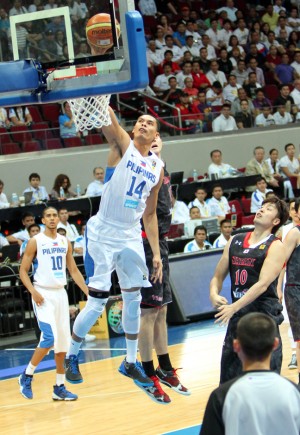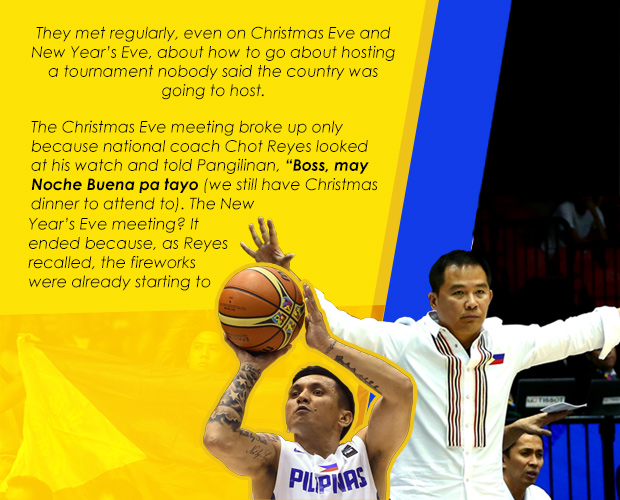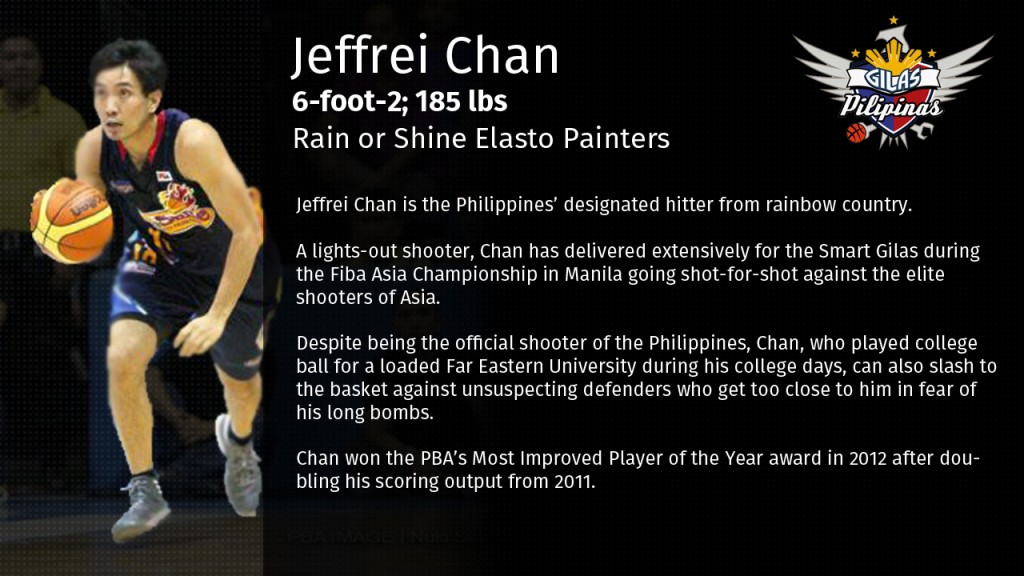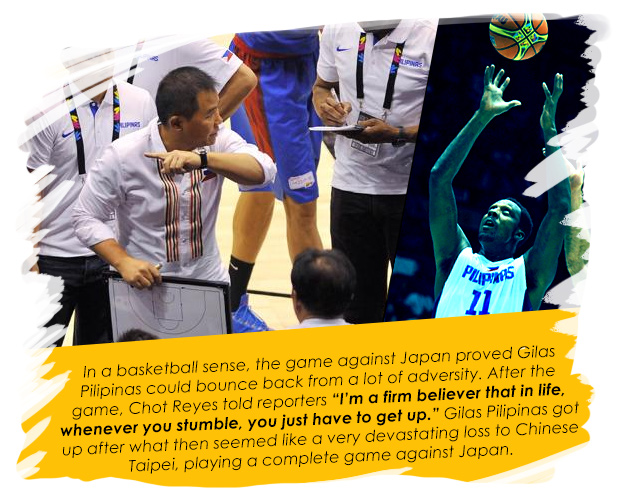Home court advantage
Even before the 2013 Fiba Asia tournament started, people were getting goosebumps over the thought of the Philippines playing in a major basketball tournament right at home. After all, in these islands, no sport can rival the passion and following basketball attracts. And then you have the men’s national basketball team, defending national pride against foreign squads right on its home floor. It was the perfect combination for a really electric atmosphere.
This was one of the scenarios that pushed the country’s national basketball federation, led by business tycoon Manny V. Pangilinan, to fly to Japan during the 2012 Stankovic Cup to bid for the hosting of the Asian championship. “It’s different if you’re playing in front of your own crowd,” Pangilinan said. With three spots to the 2014 Fiba World Cup at stake in the Fiba Asia tilt, Pangilinan wanted no stone unturned for Gilas Pilipinas’ shot at history.
Pangilinan and his team, dapper in their business suits, made an impressive video presentation of the Philippine bid. Still, the Fiba Asia tournament was awarded to Lebanon. Veteran player Fadi El-Khatib made the presentation for Lebanon. He showed Fiba officials a video of Lebanon’s bid. He was dressed in his team’s sports attire.
But the SBP officials never gave up. They reminded Fiba Asia that if Lebanon could not host the tournament, Manila was always ready and prepared to sub.
“We wrote [to Fiba Asia] a lot. Hindi namin sila tinantanan; palagi namin silang kinukulit (we didn’t let up; we kept pestering them),” Pangilinan said.
Just how many letters did the SBP send? “Enough to persuade them,” Pangilinan said, laughing.
And the SBP did not stop there. They met regularly, even on Christmas Eve and New Year’s Eve, about how to go about hosting a tournament nobody said the country was going to host.
The Christmas Eve meeting broke up only because national coach Chot Reyes looked at his watch and told Pangilinan, “Boss, may Noche Buena pa tayo (we still have Christmas dinner to attend to). The New Year’s Eve meeting? It ended because, as Reyes recalled, the fireworks were already starting to go off.
“We wanted to make sure that if we did get [hosting rights], we had everything in place.
Eventually, fate intervened. Because of the conflict in Syria and security issues in nearby Lebanon, Fiba Asia was forced to rethink the whole hosting issue. On Jan. 10, 2013, national coach Chot Reyes made the announcement on Twitter.
“It’s OFFICIAL: Manila hosts 2013 FIBA ASIA CHAMPIONSHIPS! All d hardwork thru Xmas & New Year paid off. Now d really difficult work begins,” Reyes posted.
What did that anecdote mean on Day 5 of the Fiba Asia tournament? Well, on Day 5, the connection between the team and its faithful became a little bit more personal. And it became proof that we had a different concept of home court advantage than what other teams expected.
“I don’t think a lot of teams we played [understood] what we meant when we said we have home court advantage,” point guard Jimmy Alapag said. “None of those countries expected that kind of support.”
Exactly what kind of support?
For starters, fans that filled the Mall of Asia Arena in the game against Japan jumped on every reason to get really loud. They cheered at how the Filipinos competed right from the opening tip. Japan’s big men, particularly Kosuke Takeuchi and JR Sakuragi, managed to hit their shots, but there was no deep hole Gilas Pilipinas needed to climb out of on Day 5. So when they unleashed a third-quarter run, it was more to lower the hammer than to rally from a deficit.
Fans roared at every shot during that huge third quarter, where Gilas Pilipinas, riding on Jeff Chan’s sniping, wound up building a 24-point buffer going into the final period. They did the wave during game breaks. There were other moments, too, that drew cheers and jeers from fans—not just those who were inside the coliseum. With less than seven minutes remaining in the third period, Sakuragi got entangled with Gilas Pilipinas’ Marc Pingris and the two traded words and elbows. Social media exploded with 140-characters-or-less shoutouts at the little sidelight.
For those who still don’t know, Marc Pingris is also known in PBA circles as the “Pinoy Sakuragi” for his infectious energy on the court that reminds people of Hanamichi Sakuragi, an animated character of the popular Japanese manga show Slam Dunk. The real Sakuragi, on the other hand, is a naturalized player from the US, whose original name is Milton “JR” Henderson. He needed a Japanese name to speed up his naturalization process and picked Sakuragi for one reason: Sakura, in Japan, means cherry blossoms, and in a 2008 interview with the LA Times, Sakuragi said: “Cherry blossoms are kind of a big thing here (in Japan).”
He later heard about Hanamichi Sakuragi and told the LA Times that people originally thought the cartoon character was the reason he chose the name. “The younger people thought that’s why I took it—I didn’t bother to say it wasn’t. I just went along with it.”
Sakuragi wound up with 19 points in a 90-71 loss to Gilas Pilipinas.
But that wasn’t where the fans and the team truly connected.
As the game was winding to its finish, it was time for the bench to mop up the rout. Among those who checked in was Gary David. With coach Chot Reyes facing a lot of adversity in forming the team, David was one of those who made things easier for him. “We wanted a lot of players but for one reason or another, they weren’t available,” said Reyes. “Gary David was the one who was there right from the start.”
Going into the Japan game, David was shooting 2-of-18 from the field. His minutes were on a spiral. He played 12 against Saudi Arabia, 7 against Jordan and 6 against Chinese Taipei.
Worse, he was getting a lot of hate all over social media. If there was anybody on the team who badly needed some love, it was David.
And he got it in huge, unwavering doses toward the end of the game.
For some reason, the crowd, through no prior plan or present prompting, singularly decided to chant David’s name loudly. He only made two baskets during the cleanup minutes of Day 5. But that didn’t stop the crowd from serenading him with chants of his name each time he touched the leather.
And it touched both David and his family, who bore the brunt of his struggles and social media hate (Gilas Pilipinas players were told to stay off social media during the tournament). At home, daughter Maxene, 4, kept asking why Daddy, easily one of the best scorers in the Philippine Basketball Association, couldn’t seem to buy a basket during the Fiba Asia.
“Gary explained patiently that this is not like the PBA,” said wife Jen, 30, in Filipino.
When the final buzzer exploded and with the crowd still cheering, David rushed to wife and daughter at courtside and shared a tear-filled hug with them.
“If I could only go up to everyone in the coliseum, I would, just to say thank you to all of them,” said Jen David. Maxene, meanwhile, just sobbed on, speechless.
“Mababaw ang luha nyan (She cries easily),” Jen said.
Bong Ruado, a businessman who also does political consultancy work, was among those who chanted David’s name. Ruado was a fixture in the stands during the entire Fiba Asia championship. A passionate basketball fan who cheers for the San Miguel Beer franchise in the PBA and who spent a princely sum to watch Gilas up close every single game of the tournament, Ruado was close to the David family during that embrace.
“It was quite an emotional moment for us who saw it,” said Ruado.
“It’s touching,” said David of the crowd support. “The fans, my family, my teammates, they never gave up on me.”
In a basketball sense, the game against Japan proved Gilas Pilipinas could bounce back from a lot of adversity. After the game, Chot Reyes told reporters “I’m a firm believer that in life, whenever you stumble, you just have to get up.” Gilas Pilipinas got up after what then seemed like a very devastating loss to Chinese Taipei, playing a complete game against Japan.
But Day 5 proved this was more than just basketball now. And even when put in basketball terms, Gilas Pilipinas’ bid for a spot in the 2014 Fiba World Cup went beyond the team members. The game against Japan proved that the sport’s most passionate fans would be part of the journey. The fans refused to leave it to the coaching staff to prop up the confidence of an off-target gunner.
“When the crowd and the team came together for Gary, it proved that we are one family,” said Marcus Douthit. “We fight for one guy that was down—not just the team but also the whole country too.”
“I was actually surprised at how well [the fans] rallied behind Gary,” Reyes said. “That was very important.”
This kind of support was what Pangilinan, Reyes and the SBP hoped for when they fought to bring the Fiba Asia here.
“Actually, the fans even exceeded our expectations,” said Pangilinan, who considered himself a mere spectator during the 11-day journey of Gilas Pilipinas and felt what it was like to share an arena with an adoring throng of supporters.
“There was something surreal, supernatural, about the fans’ devotion for the team,” he said. “You could feel the genuine love of Filipinos for basketball and for the team.”
“I’ll be honest. We couldn’t have achieved what we achieved if not for the crowd,” Reyes said. “We didn’t have enough time [to prepare], we didn’t have enough experience [and] we didn’t have competition under our belt. And I felt that the one that would compensate for everything we didn’t have was the home court advantage.”
“Pumipila sila kahit di nila alam kung makakakuha sila ng ticket. Yung iba, sa labas na lang nanood kasi wala ng mabili na ticket (They line up even if a ticket is an uncertainty. Some of them couldn’t buy a ticket at all and simply watched outside),” said Ranidel de Ocampo. “Na-appreciate naming mga players yun. Kaya na-inspire kami. (We appreciated that. We were inspired by them).”
Throughout the Fiba Asia tournament, players would consistently play homage to the support and love the fans provided the team. It would, in fact, be a familiar refrain. But if you needed a snapshot of what it meant for the team to have the home court edge, you have to go back to Day 5. You go back to the night when the crowd decided in unison, without any prodding at all, to lift the sagging spirits of a struggling scorer.
That night, more than any night during the 2013 Fiba Asia championship, was the moment when the fans told the team: You are never going to be alone in this mission. Not while we’re around.
“We talked about it [before the tournament started], how crazy the crowd was going to be,” Reyes said.
“It turned out the way we imagined it, and more.”
Part 6, up Sept. 3, 12 nn, Manila time.




